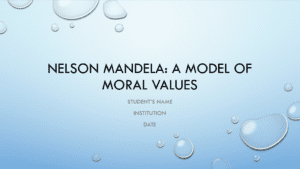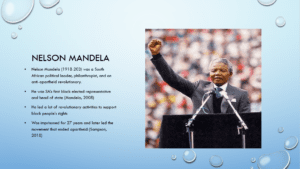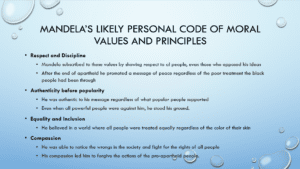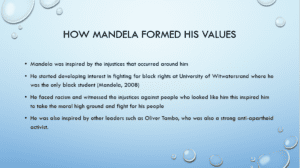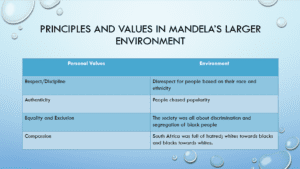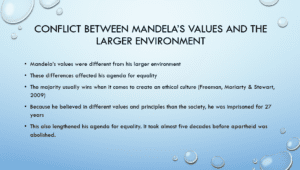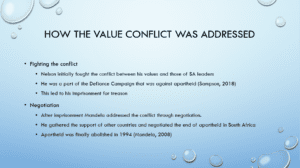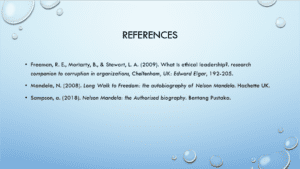Nelson Mandela – A Model of Moral Values
Our assignment writing services will allow you to attend to more important tasks as our experts handle your task.
Nelson Mandela is a significant figure in history and the contemporary society. This man, born in 1918 and died in 2013, was a South African philanthropist, politician, and most importantly, a revolutionary who fought for the rights of black people in South Africa. The laws of apartheid separated the blacks from the white people. It ensured that black people had unequal access to almost all of the amenities and resources that white people could access. Nelson Mandela was against this discrimination. He led many revolutionary activities to support the rights of black people. This led to him being imprisoned for 27 years but he still came out supporting his agenda of equality. He became the first elected black representative in South Africa and also the first black president in the country.
Nelson Mandela embodies a lot of positive values and principles that the people and leaders today can learn from. If he had a personal code of moral values and principles, the following are some of the qualities that would be included.
Respect and Discipline
Mandela subscribed to the values of respect and discipline as seen in the ways he interacted with people, including those who opposed his ideas on equality. For example, after the end of apartheid he promoted a message of peace regardless of the poor treatment the black people had been through. A normal person would have been angry and would want revenge but he had the discipline to understand that that was not the right decision.
Authenticity before popularity
He was authentic to his message regardless of what popular people supported. Even when all powerful people were against him, he stood his ground. Even after facing a lot of years in prison, he did not change his support for the rights of black people.
Equality and Inclusion
He believed in a world where all people were treated equally regardless of the color of their skin. This included the white people who he lived in harmony with after his election as president.
Compassion
He was able to notice the wrongs in the society and fight for the rights of all people. His compassion led him to forgive the actions of the pro-apartheid people.
Mandela’s values were formed mainly from his environment. He was one to pay attention to the occurrences in his environment and fight for better. Mandela was inspired by the injustices that occurred around him. He started developing interest in fighting for black rights at University of Witwatersrand where he was the only black student. He faced racism and witnessed the injustices against people who looked like him this inspired him to take the moral high ground and fight for his people (Sampson, 2018). His values were developed because they were necessary for him to meet this agenda of ending the discrimination and exclusion of black South Africans. He was also inspired by other leaders such as Oliver Tambo, who was also a strong anti-apartheid activist.
Nelson Mandela’s personal values were highly inconsistent with those of the society that he lived in. First, Mandela embodied the values of discipline and respect. Meanwhile, the society was filled with a lot of disrespect for people based on their race and ethnicity. Secondly, Mandela was an authentic man while people around him supported what was popular. He was for equality and inclusion while the society was characterized by a lot of discrimination and segregation of black people. Lastly, Mandela was a very compassionate person while the South African society was filled with hated. Black people hated the whites because of the discrimination against them while the whites hated blacks for their perceived inferiority.
The differences between Mandela’s personal values and principle and those that characterized the South African society created a conflict that affected his actions. An ethical climate is promoted by the collective actions of the people that make up one community. Regardless of how positive the values of a leader are, their agenda cannot be fulfilled if the people they lead to not embody the same values (Freeman, Moriarty & Stewart, 2009). For Mandela, these differences causes negative implications for his fight for equality. He was imprisoned for 27 years because other people believed he was on the wrong in his activism. This also prolonged the fight for equality causing the extension of apartheid for close to five decades.
When there is a conflict in values, it is unlikely that the people involved can be in agreement. Mandela’s first strategy for dealing with the conflict in his values and those of the environment was through rebellion. He first fought the conflict by being a part of defiance groups. This only lead to his political imprisonment for 27 years. After being released from prison, Mandela used the strategy of negotiation with the help of other countries’ leaders. Eventually he managed to get apartheid to be abolished.
ORDER A PLAGIARISM-FREE PAPER HERE
We’ll write everything from scratch
Question

Nelson Mandela – A Model of Moral Values
Please identify and describe a model that embodied moral values such as Gandhi, King, Mother Teresa, Mandela, etc. Using a PowerPoint presentation, with detailed information in the notes section to support your points, please answer the following questions: Describe his or her likely personal code of moral principles and values. How were these principles and values formed? Were these values and principles consistent with those of this person’s larger environment? If a conflict between personal and larger values was present, how was it addressed?
Your presentation should be 4-6 slides in length, not counting title and reference slides, and conform to the CSU-Global Guide to Writing and APA. Include at least three scholarly references in addition to the course textbook. The CSU-Global Library is a good place to find these references.

